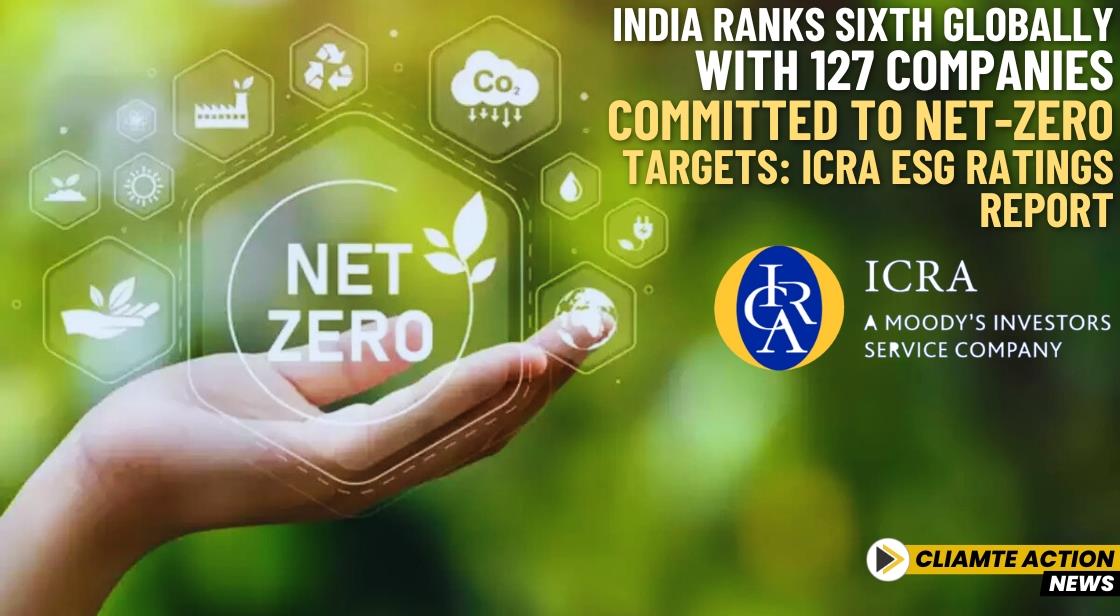India Ranks Sixth Globally with 127 Companies Committed to Net-Zero Targets: ICRA ESG Ratings Report

News Synopsis
India has secured the sixth position globally in terms of corporate climate action, with 127 Indian companies pledging to meet net-zero targets under the Science Based Targets initiative (SBTi), as per a report by ICRA ESG Ratings. These companies are primarily from non-high-emission sectors, including textiles, software, and pharmaceuticals, and have demonstrated a strong commitment to addressing climate change.
India’s Position in Global Net-Zero Commitments
Despite India’s robust presence in the global net-zero movement, the United Kingdom leads with the highest number of companies aligned with SBTi net-zero targets. In stark contrast, China, which is the world's largest emitter, has a comparatively lower percentage of companies taking such commitments.
The report highlights the pivotal role of India in corporate climate action, urging continued innovation and support for regulatory measures to encourage greater participation from companies in high-emission sectors.
Focus on Non-Hard-to-Abate Sectors
The report indicates that the majority of the Indian companies committed to net-zero goals come from sectors traditionally considered to have a lower carbon footprint. Approximately 93% of the 127 companies hail from sectors like textiles, software, and services, which are categorized as non-hard-to-abate sectors.
However, around 7% belong to industries with high emissions such as construction materials and mining, demonstrating India's commitment to tackling emissions across various sectors.
“Our findings emphasize the importance of committing to net-zero targets and how aligning with SBTi is a good way to enhance climate strategies, promote transparency and accountability, and highlight the need for continued innovation and regulatory support,” said Sheetal Sharad, Chief Ratings Officer, ICRA ESG Ratings.
Renewable Energy Shift in the Power Sector
The report also highlights a significant trend in the power sector, particularly among companies with net-zero commitments. A shift towards renewable energy is evident, with companies actively reducing their carbon footprints. While coal-based power generation remains prevalent, the adoption of renewable energy sources is steadily increasing, helping to mitigate emissions.
Emissions in High-Emission Sectors
In sectors such as cement and mining, where emissions remain high due to processes like clinker production, companies are adopting alternative fuels and carbon capture technologies to reduce their impact.
The report notes that while some companies have managed to stabilize or reduce emission intensities over the last six years, the reduction in absolute emissions remains limited, with an approximate decline of 11%.
Notably, the report observed that fewer than 10% of companies from power, energy, and cement sectors—sectors that collectively account for about 55% of India’s emissions—have committed to SBTi net-zero targets. This indicates a potential challenge in meeting India's overall net-zero goals, as high-emission sectors are yet to fully commit to the initiative.
Challenges and the Road Ahead
The report concludes by stressing that, despite a growing number of companies setting net-zero targets, the pace of adoption among high-emission sectors remains slow. This may undermine efforts to meet the global climate goals. “This indicates that despite the large number of companies setting up targets, it may not be sufficient to meet the net-zero goal as the high-emitting companies are still not fully committed,” the report notes.
India’s role in the global climate action landscape remains critical, and further efforts are needed to bring high-emission industries on board. These industries must be encouraged to take concrete steps towards net-zero emissions to ensure that the country can contribute effectively to global climate goals.
Conclusion
India's position as the sixth-largest contributor to the global net-zero movement highlights the growing commitment of its corporate sector toward addressing climate change. With 127 companies now committed to science-based targets through the SBTi initiative, there is a clear shift towards renewable energy, especially in the power and other non-hard-to-abate sectors like textiles, software, and pharmaceuticals.
However, challenges remain. While industries in lower-emission sectors are making significant strides, the high-emission sectors like cement, mining, and power are lagging behind in their commitment to net-zero goals.
As India continues to play a critical role in the global climate action agenda, it will be crucial for these high-emission sectors to adopt sustainable practices and align with global standards.
Accelerating this shift will not only help India meet its national and international climate targets but also contribute to broader global efforts to mitigate climate change.
This calls for enhanced regulatory support, innovation, and a stronger commitment from both the private and public sectors to reduce emissions and foster sustainable growth. By addressing these gaps, India can solidify its leadership in corporate climate action and ensure a sustainable future for all.









